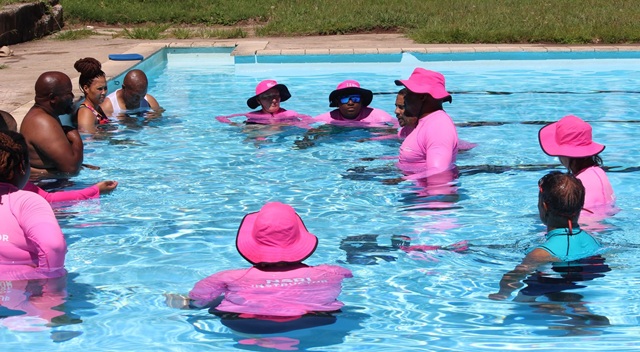
By Ephreeda Banda
When we think about campus safety, conversations often turn to crime prevention, health services, or road safety. But there is another silent danger that claims hundreds of thousands of lives every year: drowning.
Globally, drowning is the third leading cause of accidental death, according to the World Health Organisation, with around 300, 000 people losing their lives annually. For South Africa, with its expansive coastline, numerous rivers, and a strong beach culture, the risk is even higher, particularly for children and young adults.
Yet, for something so common, drowning remains one of the most overlooked public health issues. It often happens quietly, in seconds, and without the dramatic struggle we see in films. That reality was central to the message Rhodes University championed on 25 July 2025, when it marked World Drowning Prevention Day - a day declared by the United Nations in 2021 to draw attention to this preventable tragedy.
In partnership with the National Sea Rescue Institute (NSRI), Rhodes University turned awareness into action by hosting a series of activities aimed at equipping people with practical skills and life-saving knowledge. The day’s theme, ‘Whether at the pool or the beach, knowing how to stay safe saves lives’, guided every conversation and demonstration.
Rhodes University Sports worked alongside NSRI volunteers to engage students and staff on campus while extending the campaign to local schools and community spaces.
Demonstrations showed how to float safely if caught in deep water, how to use flotation devices during a rescue, and how to remain calm in an emergency. These lessons were designed not only for swimmers but also for those who cannot swim, because knowing how to survive, even without strong swimming ability, can make the difference between life and death.
Born out of tragedy
This initiative forms part of an ongoing collaboration between Rhodes University and the NSRI that began earlier this year with the launch of the Survival Swimming Programme on campus. For Carol Mewse, NSRI Station 11 crew member and coordinator for the Survival Swimming Programme (Sunshine Coast), the programme carries a profound sense of urgency. “The programme came about after the drownings on New Year’s Day in 2023, where three youths lost their lives in Kenton-on-Sea. We realised that something needed to be done to prevent such incidents in the future,” she explained.
These tragedies are not isolated. Many South Africans grow up without access to swimming lessons, even though they live near water bodies. This makes survival swimming a crucial skill for everyday safety. Unlike traditional swimming classes, the programme prioritises four essential survival skills: breathing, orientation, floating, and movement through water, designed for real-world emergencies rather than competitive swimming.
The impact of the programme has already been seen on campus. One remarkable example involves Lulama Khila, a sports facility facilitator at Rhodes University, who saved a student from drowning. Khila managed to perform the rescue using a pink buoy, one of the flotation devices promoted by the NSRI, despite not being a confident swimmer himself. His quick thinking and use of the training he received highlight exactly why these initiatives matter.
For Sue Smailes, Director of the Office of the Vice-Chancellor and Chairperson of Rhodes Sports Council at Rhodes University, these efforts go beyond institutional responsibility: “We want to do our part in preventing these tragedies and promoting water safety awareness in our community,” she said.
From campus to community
World Drowning Prevention Day offered an opportunity not only to raise awareness but to create a culture of safety that extends beyond Rhodes University’s gates. As part of the campaign, NSRI representatives and Rhodes University staff visited local schools to talk to learners about water safety and demonstrate practical survival techniques. Many of these learners come from communities where swimming lessons are rare, yet water hazards are part of everyday life.
Di Hornby, Director of Community Engagement at Rhodes University, sees this outreach as essential: “We encourage our staff and students to get involved by becoming trained trainers or simply by supporting the programme. Together, we can create a safer community and prevent the loss of precious lives,” she said.
For parents and educators in these communities, the campaign has provided reassurance and hope. Several teachers expressed interest in incorporating water safety education into life orientation classes, ensuring that the lessons have a lasting impact.
Why it matters
South Africa faces a sobering reality: drowning remains a leading cause of accidental death, particularly among children under 14. This is compounded by the fact that many rural and township communities lack access to swimming facilities and water safety training. Add to this the growing risks of climate change, including flash floods and unpredictable rainfall, and the need for widespread survival skills becomes urgent.
The United Nations established World Drowning Prevention Day to address these challenges globally. It calls on governments, institutions, and communities to invest in life-saving measures such as teaching survival swimming, installing barriers to control access to water, and raising awareness. Rhodes University’s partnership with NSRI is a practical example of this call to action being met at a local level.
The work does not end with a single day of awareness. The long-term vision is ambitious: to create a ripple effect of safety, where knowledge and confidence around water spread from individuals to families, from families to communities, and eventually, across the region.
As the United Nations reminds us each year, drowning is preventable. Through initiatives like this, prevention moves from theory to practice. For Rhodes University and the NSRI, it is about more than saving lives in emergencies; it is about building a culture of awareness and preparedness - one lesson, one life at a time.
